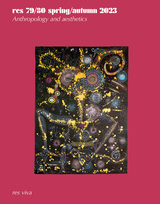7 start with E start with E
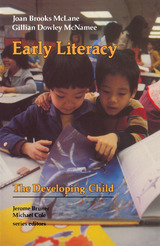
Four-year-old Joshua challenges his father to a game: Can he come downstairs before Joshua writes the word to? Rachel, two and a half, makes a series of wavy lines on a piece of paper and calls it a “thank-you letter to Grandma.” In Early Literacy Joan McLane and Gillian McNamee explore the ways young children like Joshua and Rachel begin to learn about written language. Becoming literate requires mastering a complex set of skills, behaviors, and attitudes that makes it possible to receive and communicate meaning through the written word. McLane and McNamee provide a fresh examination of this process in light of recent research.
The authors look closely at what young children do with writing and reading. As children play with making marks on paper and listen to stories being read aloud, they begin to discover uses and purposes for written language. They learn that they can use writing to communicate with people they care about and that reading story books opens up new ideas and experiences. As children experiment with writing and reading in their talking, drawing, and pretend play, they can build “bridges to literacy.”
The authors emphasize the importance of children's relationships with significant adults and peers for growth in literacy. They also devote chapters to early literacy development at home and in the neighborhood, and in preschool and kindergarten settings. In one daycare center for inner-city children, for example, where a favorite activity is dictating and acting out stories, children become active participants in a community of readers and writers—a literate culture.
Through its clear and concise discussion of young children's growth toward literacy, and its examples of the contexts that encourage and enrich that growth, Early Literacy will serve as a valuable resource for parents, teachers, and others who work or play with young children.
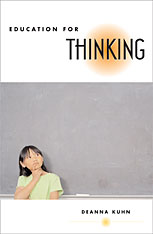
What do we want schools to accomplish? The only defensible answer, Deanna Kuhn argues, is that they should teach students to use their minds well, in school and beyond.
Bringing insights from research in developmental psychology to pedagogy, Kuhn maintains that inquiry and argument should be at the center of a “thinking curriculum”—a curriculum that makes sense to students as well as to teachers and develops the skills and values needed for lifelong learning. We have only a brief window of opportunity in children’s lives to gain (or lose) their trust that the things we ask them to do in school are worth doing. Activities centered on inquiry and argument—such as identifying features that affect the success of a music club catalog or discussing difficult issues like capital punishment—allow students to appreciate their power and utility as they engage in them.
Most of what students do in schools today simply does not have this quality. Inquiry and argument do. They are education for life, not simply more school, and they offer a unifying purpose for compulsory schooling as it serves an ever more diverse and challenging population.

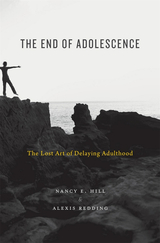
Is Gen Z resistant to growing up? A leading developmental psychologist and an expert in the college student experience debunk this stereotype and explain how we can better support young adults as they make the transition from adolescence to the rest of their lives.
Experts and the general public are convinced that young people today are trapped in an extended adolescence—coddled, unaccountable, and more reluctant to take on adult responsibilities than previous generations. Nancy Hill and Alexis Redding argue that what is perceived as stalled development is in fact typical. Those reprimanding today’s youth have forgotten that they once balked at the transition to adulthood themselves.
From an abandoned archive of recordings of college students from half a century ago, Hill and Redding discovered that there is nothing new about feeling insecure, questioning identities, and struggling to find purpose. Like many of today’s young adults, those of two generations ago also felt isolated and anxious that the path to success felt fearfully narrow. This earlier cohort, too, worried about whether they could make it on their own.
Yet, among today’s young adults, these developmentally appropriate struggles are seen as evidence of immaturity. If society adopts this jaundiced perspective, it will fail in its mission to prepare young adults for citizenship, family life, and work. Instead, Hill and Redding offer an alternative view of delaying adulthood and identify the benefits of taking additional time to construct a meaningful future. When adults set aside judgment, there is a lot they can do to ensure that young adults get the same developmental chances they had.
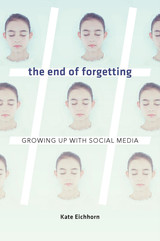
Thanks to Facebook and Instagram, our childhoods have been captured and preserved online, never to go away. But what happens when we can’t leave our most embarrassing moments behind?
Until recently, the awkward moments of growing up could be forgotten. But today we may be on the verge of losing the ability to leave our pasts behind. In The End of Forgetting, Kate Eichhorn explores what happens when images of our younger selves persist, often remaining just a click away.
For today’s teenagers, many of whom spend hours each day posting on social media platforms, efforts to move beyond moments they regret face new and seemingly insurmountable obstacles. Unlike a high school yearbook or a shoebox full of old photos, the information that accumulates on social media is here to stay. What was once fleeting is now documented and tagged, always ready to surface and interrupt our future lives. Moreover, new innovations such as automated facial recognition also mean that the reappearance of our past is increasingly out of our control.
Historically, growing up has been about moving on—achieving a safe distance from painful events that typically mark childhood and adolescence. But what happens when one remains tethered to the past? From the earliest days of the internet, critics have been concerned that it would endanger the innocence of childhood. The greater danger, Eichhorn warns, may ultimately be what happens when young adults find they are unable to distance themselves from their pasts. Rather than a childhood cut short by a premature loss of innocence, the real crisis of the digital age may be the specter of a childhood that can never be forgotten.
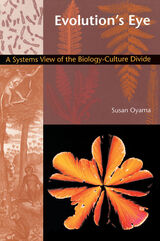
While acknowledging that, in an uncertain world, it is easy to “blame it on the genes,” Oyama claims that the renewed trend toward genetic determinism colors the way we think about everything from human evolution to sexual orientation and personal responsibility. She presents instead a view that focuses on how a wide variety of developmental factors interact in the multileveled developmental systems that give rise to organisms. Shifting attention away from genes and the environment as causes for behavior, she convincingly shows the benefits that come from thinking about life processes in terms of developmental systems that produce, sustain, and change living beings over both developmental and evolutionary time.
Providing a genuine alternative to genetic and environmental determinism, as well as to unsuccessful compromises with which others have tried to replace them, Evolution’s Eye will fascinate students and scholars who work in the fields of evolution, psychology, human biology, and philosophy of science. Feminists and others who seek a more complex view of human nature will find her work especially congenial.
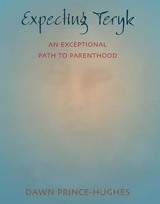
“Expecting Teryk is a rich and sumptuous work that speaks to the deeper realities and represents a unique viewpoint of experiences shared by all individuals who choose the path to parenthood.”—Disability, Pregnancy, and Parenthood
The period just prior to the birth of a child is a time of profound personal transformation for expectant parents. Expecting Teryk: An Exceptional Path to Parenthood is an intimate exploration, written in the form of a letter from a parent to her future son, that reclaims a rite of passage that modern society would strip of its magic.
Dawn Prince-Hughes, renowned author of Songs of the Gorilla Nation: My Journey through Autism, considers the ways being autistic might inform her parenting. She also candidly narrates her experience of becoming a parent as part of a lesbian couple—from meeting her partner to the questions they ask about their readiness to become parents and the practical considerations of choosing a sperm donor.
Expecting Teryk is viewed through the lens of autism as Prince-Hughes shares the unique way she sees and experiences the world—as well as her aching will to be fully present for her son. Contemplating the evolutionary traditions of parenting from both animal and human perspectives and the reassurances that nature offers, Expecting Teryk is a work of sensuous wonder that speaks to the deeper realities and archetypal experiences shared by all who embark on the journey of parenthood.
READERS
Browse our collection.
PUBLISHERS
See BiblioVault's publisher services.
STUDENT SERVICES
Files for college accessibility offices.
UChicago Accessibility Resources
home | accessibility | search | about | contact us
BiblioVault ® 2001 - 2024
The University of Chicago Press






